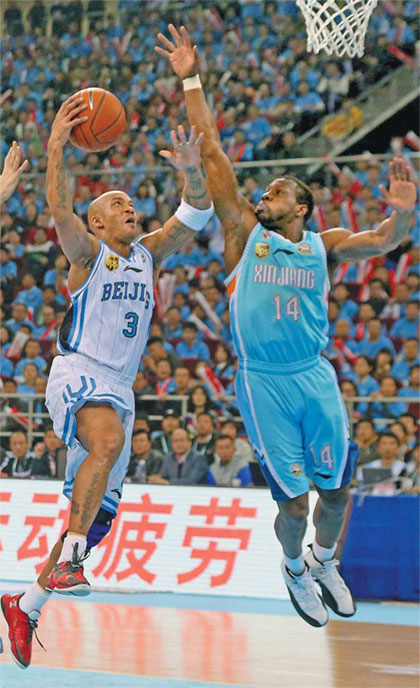CBA remains more style than substance
Despite growing popularity and swelling coffers, the Chinese Basketball Association is still struggling to project a true professional image and nurture enough young talent for the country to regain its dominance in the sport in Asia.
Boasting NBA-standard facilities, fancy promotions and intensive media coverage, the CBA has developed into arguably the brightest jewel on China's sports scene, with last month's finals drawing huge TV numbers nationwide.
The six-game final series, won 4-2 by the Beijing Ducks over the Xinjiang Flying Tigers, attracted 162 million viewers - the year's second most-watched sporting event behind tennis star Li Na's Australian Open final in January, according to CSM Media Research.
The high demand for finals tickets made headlines as the MasterCard Center, Beijing's home arena, was forced to run a lottery for its 7,000 tickets every night, while the price for scalped tickets rose to at least triple their face value.
The CBA's promotional partner, Infront China, lured a record number of 25 sponsors who contributed a total of 500 million yuan ($80 million) for the league's 2013-14 season.
Even with all that, the CBA's prosperity has failed to trickle through to the national team, which will miss the FIBA World Cup in September after finishing fifth at the Asian Championships (qualifying tournament for the World Cup) - its worst result since 1975.
According to pundits, one reason for that is the dominance of foreign players in the CBA, which has shrunk the growing space for homegrown talent.
Su Qun, editor-in-chief of Basketball Pioneers, said the use of import players should be limited.
"The use of foreigners has improved the competitive level of the CBA but produced negative effects as well," said Su. "Most of the teams have become heavily dependent on foreigners and they are obsessed with signing expensive former NBA players to sell tickets. The result is that Chinese players only get a few minutes of floor time each game."
Under the current format, CBA teams are allowed to sign two overseas players, who can play a combined six quarters per game or five when playing against the Chinese army team, the Bayi Rockets.
This past season the CBA's 18 teams imported 39 foreigners. Of that number, 29 were ex-NBAers, including former New York Knicks guard Stephon Marbury, his cousin Sebastian Telfair, who last played for the Phoenix Suns, and Josh Powell, who played for the Los Angeles Lakers championship squad.
Keen to recoup their heavy investments in star imports, CBA teams usually give their foreigners massive minutes on the floor while leaving domestic youngsters to watch from the bench.
The two-on-two battles between Beijing's super duo of Marbury and Randolph Morris and Xinjiang's tandem of Lester Hudson and James Singleton determined this year's finals, which underlined the foreign-reliant competition of the league.
Four of the CBA's five major statistical categories were dominated by foreign players this season, with only Zhang Zhaoxu, a center with the Shanghai Sharks, breaking into the top three (second) in blocked shots per game.
Gong Luming, head coach of the national squad, faces a tough quest in defending the Asian Games championship in South Korea in September.
"The CBA has developed for 19 years, but we are still struggling in cultivating a deep talent pool. Introducing high-level foreigners is good but young players have to work harder and stay hungry to learn from the competition against them," Gong said.
Meanwhile, the CBA has a long way to go to reach its potential as a professional league in terms of management.
Despite of the existence of a league committee composed of 18 club representatives, the basketball administrative center still takes full control of all major decisions - everything from signing league sponsorship deals to upgrading stadiums.
Some owners are urging the governing body to decentralize its decision-making powers.
"The management rights should return to the league committee; that would allow policies to truly be made based on the actual situation and need of clubs," said former NBA superstar Yao Ming, who owns the Sharks.
In terms of reform, the CBA actually lags behind its soccer counterpart, the Chinese Super League, which established a body of 17 shareholders in 2005 to run the league, said Li Shengxin, a sports management expert at Beijing Sport University.
"The CBA is actually one of the most conservative governing bodies, and the process of making it professional has almost stopped since the end of the 2008 Beijing Olympics," Li said.
|
Ex-NBAers Stephon Marbury (left) of the Beijing Ducks and Lester Hudson of the Xinjiang Flying Tigers stole the show during the CBA's championship final series, which the Ducks won 4-2. Hei Ke / For China Daily |



















